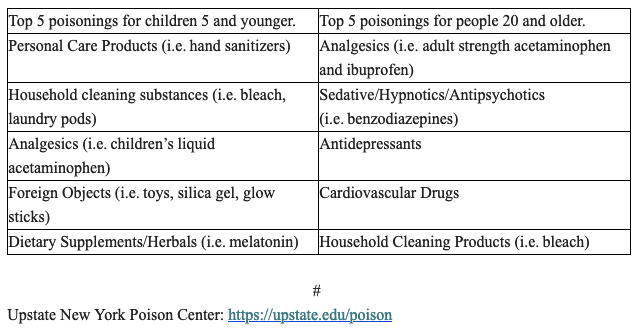Featured News - Current News - Archived News - News Categories
Erie County highlights tips and strategies to prevent unintentional poisonings
Submitted by the Erie County Department of Health
Pause your scrolling for a moment and save this number to your phone’s contact list: 1-800-222-1222.
Calling 1-800-222-1222 will connect you with your nearest poison center. Erie County residents’ calls go directly to the Upstate New York Poison Center, which serves 54 counties in New York and manages more than 50,000 calls each year. It is staffed with experts trained in preventing poisoning and limiting injury from poisonings, and is open 24/7, 365 days a year.
When unintentional poisonings happen with chemicals or medicine, call the Poison Helpline at 1-800-222-1222. Get help right away from a nurse, pharmacist, or other poison experts. If someone has trouble breathing, call 9-1-1 or your local emergency ambulance number right away.
“If you are in a situation where you know or suspect that a person or pet in your home has ingested or touched something poisonous, do not delay in making that call. Upstate New York Poison Center experts will be able to direct you on any immediate actions to take, from watching and waiting, to seeking medical care, or calling 9-1-1,” Erie County Health Commissioner Dr. Gale Burstein said.
National Poison Prevention Week takes place every year on the third week of March. Its purpose is to draw attention to the dangers of poisoning from everyday household items.
Just take a quick look under your kitchen sink, in your laundry room, or in your medicine cabinet: You will find bottles, boxes and cans that contain items that could be poisonous. Cleaning products, prescription drugs, pesticides, chemicals and certain hair and beauty products can pose a health risk to adults, children and pets.
This week is about raising awareness and being mindful about the commonplace risks that lurk in our homes.
“By educating local residents about preventive steps in the home and in their lives, we can make common poison injuries less common,” Burstein said. “It is vital that people arm themselves with basic information on poison prevention in the home, such as keeping chemicals out of the reach of children, and carefully reading the labels and dosages on all products. I strongly urge all parents and caregivers to take an extra moment to ensure that products are stored properly and out of reach of children.”
In the U.S., more than 2 million cases of potential poisonings are reported every year. Over 90% of these happen at home, and most involve young children. Every day, over 300 children are treated in emergency departments because of poisoning. On average, two children die each day because of these events. Most of these incidents are caused by highly toxic everyday household items such as cleaning products and medicine.
The Upstate New York Poison Center provides a variety of resources tailored for different needs, including child care centers, in-home safety, seasonal poisoning risks, how to dispose of medications safely, tips for medication safety, and specialized advice for older adults. It also offers guidance on food and mushroom safety, handling bites and stings, and keeping pets safe from poisons. Additionally, the center has created an online guide for teachers, offering training materials for those interested in teaching poison prevention. More information can be found at https://www.upstate.edu/poison/community/teachingtools.php.
Here is what YOU can DO to prevent poisonings from happening:
√ Keep medicines and household products up high and out of reach of children.
√ Use child-resistant packaging – but remember nothing is child-proof.
√ Read the label and follow the directions on medicines and products.
√ Store poisons in the original containers.
√ Take your medicines where children can’t watch.
√ Teach children to ask an adult before eating or drinking anything.






























